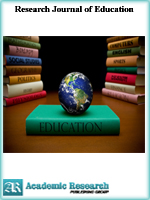Research Journal of Education
Online ISSN: 2413-0540
Print ISSN: 2413-8886
Print ISSN: 2413-8886
Quarterly Published (4 Issues Per Year)

Archives
Volume 11 Number 1 March 2025
A Practical Study on Cultivating High School Students' Scientific Thinking Using the KWL Model——A Case Study of “The Discovery of Growth Hormone”
Authors: Bo Peng ; Quanxiu Wang ; Ni Yang, et. al.
Pages: 12-24
DOI: doi.org/10.32861/rje.111.12.24
Abstract
The General Biology Course Standards for Senior High School (2017 Edition Revised in 2020) require the cultivation of students’ core biological literacy from four aspects: life concepts, scientific thinking, scientific inquiry, and social responsibility. Scientific thinking literacy helps students use biological facts and evidence to explore and explain life phenomena and laws, and examine or demonstrate biological and social issues. The KWL (know want learned) model, with the help of KWL forms, is conducive to students’ active construction of knowledge and development of thinking ability, which is a new attempt to cultivate students’ scientific thinking. In order to investigate the effectiveness of KWL mode in cultivating high school students’ scientific thinking, based on mastering the current situation of biology teachers and students’ scientific thinking in practice schools through interviews and questionnaires, this paper selected the high school biology "auxin discovery" for the teaching practice of KWL mode, and analyzed the role of the application of this mode in the process of cultivating students’ scientific thinking through educational experimental research method. The main results are as follows: (1) the application of KWL mode in high school biology teaching is conducive to cultivating students’ scientific thinking. (2) KWL mode is conducive to the development of students’ induction and generalization, model and modeling, and critical thinking. (3) KWL teaching mode can help student’s better study biology.
Exploring the Relationship between Humane Education and Active Citizenship in Early Childhood Education
Authors: Charikleia Pitsou ; Eirini Dionysopoulou
Pages: 6-12
DOI: doi.org/10.32861/rje.111.6.12
Abstract
This paper examines the intersection of humane education and active citizenship, emphasizing how nurturing empathy, critical thinking, and ethical decision-making through education fosters active citizenship. Humane education, which incorporates themes of environmental stewardship, social justice, animal welfare, and global interdependence, serves as a transformative tool for cultivating active, informed, and ethical citizens from an early age. The education of individuals from their earliest years with universal and democratic values, the principles of human rights, and a clear orientation toward respect for all living beings can contribute, on the one hand, to shaping active future citizens who prioritize the right to life and, on the other hand, to the humanization of the individual and the effort to establish lasting peace worldwide. Only within an educational environment characterized by a spirit of solidarity, mutual understanding, and respect—not only for all people but also for all living organisms—can peaceful coexistence truly be achieved, replacing the prevailing paradigm of human dominance over nature and over humanity itself. This article combines theoretical frameworks, empirical evidence, and pedagogical practices with early childhood education to illustrate the potential of humane education in advancing active citizenship.
Construction and Practice of Genetics Experiment Course Based on Modern Information Technology
Authors: Wei Zhou ; Ruijiao Zhang ; Xiaoxi Liu, et. al.
Pages: 1-5
DOI: doi.org/10.32861/rje.111.1.5
Abstract
The main purpose of this study is to analyze the problems existing in the traditional genetics experiment teaching, and put forward the corresponding improvement measures and methods based on the rapid development of modern information technology. For a long time, the teaching content of genetics experiment has been dominated by traditional confirmatory experiments. Due to the rapid development of modern information technology, there are some differences in the integration of our traditional teaching methods and modern technology, and there are few comprehensive and designed experiments based on modern information technology. This paper makes a specific analysis of the students’ own learning basis, the combination of experiment content and theory, and the cultivation of students’ comprehensive ability in genetics experiment teaching. According to the problems found, it is proposed that in the process of genetics experiment teaching, through the use of modern educational technology, the adjustment of experiment content, the improvement of teaching methods, the improvement of experimental teaching quality, and the enhancement of students’ research and innovation ability should be made. Make the comprehensive ability of students improve comprehensively.



